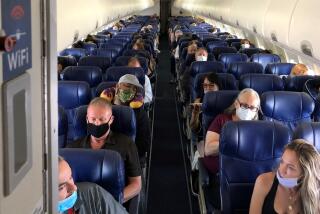Nearly Two-Thirds of Passengers in Poll Favor Total Smoking Ban on Airplanes
- Share via
DALLAS — Nearly two-thirds of airline passengers who were polled favor a total ban on in-flight smoking, according to a study released Tuesday by the American Assn. for Respiratory Care.
More than 33,000 airline passengers polled in the recent survey were asked if they favored an in-flight smoking ban. Sixty-four per cent said yes, 28% said no and 8% had no opinion.
The survey, conducted in 39 states and 89 airports across the country, found that 74% of non-smoking passengers and 30% of smokers want to fly smoke-free.
An amendment to the Department of Transportation appropriations bill prohibiting smoking on flights of two hours or less passed the House on July 13. The Senate appropriations subcommittee will consider the amendment when members reconvene after Labor Day.
Three congressmen have also introduced bills proposing a ban on smoking for all domestic flights.
The American Assn. for Respiratory Care said that in the past airlines have shied away from a smoking ban for fear of losing passengers, but those concerns may be unfounded.
Last month, Air Canada initiated nonsmoking flights on its Toronto-New York, Toronto-Newark, N.J., and Montreal-New York routes. Surveys conducted during that period showed that 96% of the passengers who flew on those flights would continue to choose Air Canada on those routes in the future.
Experiment Urged
The American Assn. for Respiratory Care has asked U.S. airlines to test an in-flight smoking prohibition from Nov. 25 to 29, but it has not received responses from the major U.S. airlines.
The respiratory group charges that ventilation systems aboard commercial airliners may not get rid of smoke as well as those found in homes or office buildings. As a result, both smoking and nonsmoking passengers may be exposed to higher concentrations of toxic gases and chemicals.
The group said it has targeted airlines for a permanent ban because second-hand cigarette smoke could be more dangerous to people on airplanes than in other public places.
More to Read
Sign up for Essential California
The most important California stories and recommendations in your inbox every morning.
You may occasionally receive promotional content from the Los Angeles Times.










